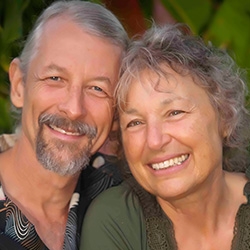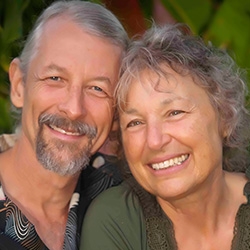

Search Results: emotion
-
Grow your compassionate presence with this 3-process exercise. The processes include: Connecting to and feeling the Life Impulse meditation, Creating your own inner space of compassionate presence exercise, and the Compassionately Embracing visualization. These processes will guide you toward deeper self connection and compassionate presence.
-
There are many polarizing issues we can resist and fight over. The word "resistance" can mean fighting against what we don’t agree with in counterproductive ways. It can also be the illusion and futility of mentally fighting against reality of 'what is'. But acceptance, non-resistance, of what is doesn’t mean powerless resignation. Another way to resist is to accept and love whole-heartedly, with empathy and care for the people doing the things we are resisting.
-
Develop resilience and stay present amidst challenge by tapping into the living energy of needs.
-
Empathy is a form of attunement. Empathy is giving your compassionate curiosity by guessing another’s feelings and needs. Consider how you live or relate to each of these 12 essential aspects of empathy. Some of them mention how we can offer empathy without abandoning ourselves, how empathy isn't always the best response, and how "Empathy can be offered when you disagree with another’s opinion, memory, or perspective."
-
Two NVC trainers went into dangerous, war torn territory to share the skills they found so valuable but end up learning that they need to first apply those skills before those they came to help could receive what they had to offer. Only when the foundation of connection and trust was built could they mediate the conflicts using empathic communication.
-
In a workshop, a hesitant white neurodivergent man faced a triggering reaction from a Global Majority transgender man. Uncovering their backgrounds, the facilitator addressed family dynamics and exclusion. A repair exercise fostered empathy, challenging assumptions and emphasizing the importance of equitable facilitation for a richer group experience.
-
Feelings and Needs form the cornerstone of Nonviolent Communication (NVC), offering a profound framework for cultivating empathy, compassion, and authenticity in our interactions. This comprehensive 9-page Feelings and Needs Reference Guide is designed to support you in integrating these vital concepts into your daily life.
-
Feelings and Needs form the cornerstone of Nonviolent Communication (NVC), offering a profound framework for cultivating empathy, compassion, and authenticity in our interactions. This comprehensive 9-page Feelings and Needs Reference Guide is designed to support you in integrating these vital concepts into your daily life.
-
- Increase your sense of connection and compassion, even in the heat of conflict
- Deepen your access to needs consciousness and the powerful energy of gratitude
- Learn how to make powerful requests that support the flow of connection
- Expand your self-empathy skills to help you shift away from reactivity
-
Mourning, grief and celebration is a way to connect with what we love and want to honor. In this trainer tip we learn that these three things can become a way for us to understand our emotions regarding our losses and appreciations.
-
This exercise explains four stages of the "Need Cycle": Fulfilled, Emerging, Urgent, Satisfying. It asks us to consider, connect and identify needs, feelings and where we are in the Need Cycle. Then it prompts us to remain mindful of the need for sustenance as we move through the cycle, noticing the subtle shifts in your physical sensations and emotions.
-
Many of us have been raised within a right/ wrong culture. From very young ages, we are asked, "What is wrong?" Yvette Erasmus shares a different view where emotions can be seen as expansion and contraction, where they can help us identify our needs.
-
Use NVC and mediation tools to transform conflict into authentic connection.
-
Learn to channel anger into mutual caring and peace through conflict mediation and brain science.
-
Explore how NVC supports mediation and conflict resolution in this engaging course recording.
-
Less than 2 weeks ago from the time I’m writing this letter, Hamas militants crossed from Gaza into Israel and killed more than 1,300 people, most of them civilians. Israel then retaliated and killed over 3,000 Gazans, most of them civilians. The death rate continues to increase every day.
-
It is the first day of December and it seems to me as if 2023 went by with a flash. I have felt deep despair about the growing division between people and the devastating impact it has had on human beings, all life in fact, including our planet. And, I have also experienced many moments of joy and satisfaction this year.
-
Do you ever think you have the perfect answer for someone who is struggling? Eric offers a tip on how to approach situations like this.
-
It’s essential to give ourselves time to grapple with the complex feelings surrounding the brutality of state-sanctioned racism and violence. But if all we do is reflect and attend to our emotions we fail to show up, where and when it counts. So let's not perpetuate the violence by standing idly. Instead, here's ten things you can do to move into concrete action to address the continued, untenable, and horrific violence of racism. A list of resources is included.
-
We can get stuck in our heads. All kinds of thoughts float into our minds. We then get thoughts about those thoughts, they might even make you feel a certain way or change a behaviour. But what happens when we connect our feelings with the physical sensations in our bodies? As part of our teaching at NVC we have incorporated movement work to help us connect with where we hold emotions and how we can process them effectively.

Quick Links
Subscription Preferences
Stay In Touch!
Looking for ways to keep up with NVC Academy news, get special offers, free resources, or words of inspiration? Here are five ways to stay engaged:



















